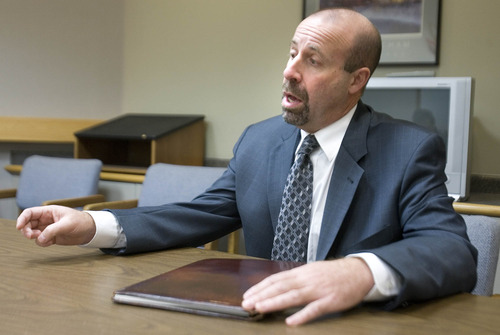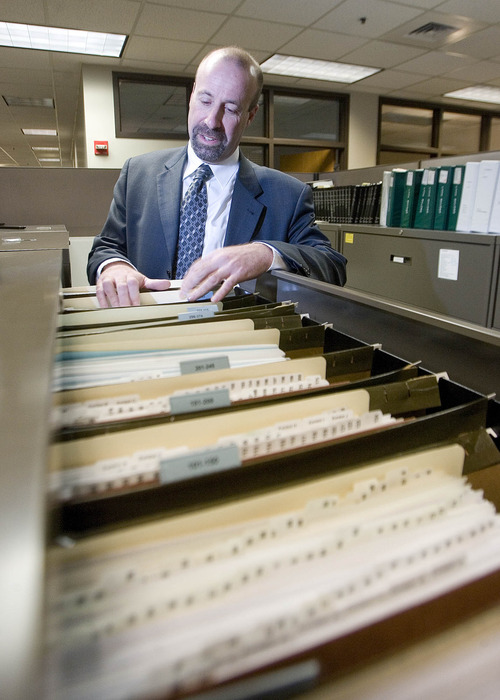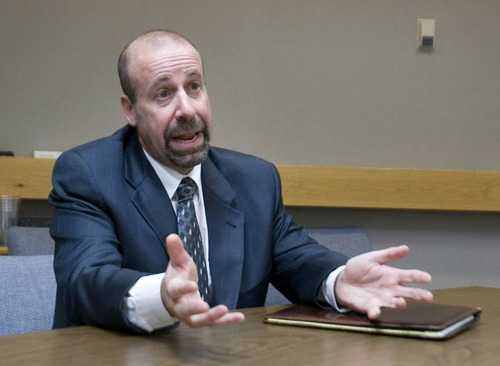This is an archived article that was published on sltrib.com in 2013, and information in the article may be outdated. It is provided only for personal research purposes and may not be reprinted.
Wallace Jeffs helped build or renovate three houses and a machine shop in Colorado City, Ariz., and Hildale, Utah.
He also sold his home in Draper and deposited the $400,000 in proceeds into the United Effort Plan (UEP), a trust that owns the properties in Colorado City and Hildale.
Now Jeffs, 51, wants something back: one of those three houses or another place he can live with his 10 minor children.
"I was a beneficiary and improved the UEP property," said Jeffs, a half-brother to Warren Jeffs, imprisoned leader of the Fundamentalist Church of Latter Day Saints (FLDS). "I was cast out of the UEP by fraud. I deserve some benefits."
Many other current or former members of the FLDS feel the same way. But how, or if, Jeffs and others with a claim to the UEP acquire some of those assets is a central issue that must be resolved before the state can end its management of the trust — a takeover that was never supposed to last nearly eight years or cost the $5.6 million a judge has said Utah must pay trust fiduciary Bruce Wisan.
Three existing proposals for ending the state's involvement all have flaws. And a decade of upheaval in the polygamous communities of Colorado City and Hildale has made any solution even more complicated.
—
Cooperation wanted • The UEP trust holds most of the Hildale and Colorado City property on which many FLDS have lived and worked. But so many people have left or been evicted from the sect, it will be tough to determine who has a rightful claim to UEP property or assets, which have an estimated value of $110 million. Plus, the three proposals all require participation from FLDS members loyal to Warren Jeffs.
Whether those loyalists will participate is one variable in determining how quickly the state can end its involvement, said Assistant Utah Attorney General David Wolf. And even if they don't, the terms of the trust require consideration of the interests of all beneficiaries, including members of the FLDS.
"How do you protect a group of people who won't participate in the process?" Wolf asked.
Here's how the existing proposals would work:
Distribute the assets • All beneficiaries of the trust would apply for assets, including houses and land. A board of Hildale and Colorado City residents would evaluate each application and determine who gets what. The recipients would receive deeds to their property. Some property would be auctioned to pay Wisan and other creditors. When everything is distributed and debts paid, the trust would be dissolved.
Liquidate the trust in an auction • All beneficiaries would describe their contributions to the trust, and receive shares of the trust that could be used toward purchasing property. An auction would be held where anyone could bid. Any shares not applied toward purchasing property could be redeemed for cash — like a sale of stock — when the liquidation is complete. Proceeds from the auction would be used to pay trust debts, including Wisan. When everything is sold and Wisan and other creditors are paid, the trust would be dissolved.
Return the trust to the people • A new governing board would be formed to operate the trust much as it was run for almost half a century, but with new bylaws that prevent discrimination against people who are no longer members of the FLDS.
At a Nov. 30 community meeting at El Capitan High School in Colorado City, Wisan offered a fourth option: mediation with the FLDS. But none of the few hundred people who attended the meeting raised their hands in support. A majority raised their hands in favor of the distribution plan.
Any solution will have to be approved by 3rd District Judge Denise Lindberg, who signed off on the state takeover of the UEP in 2005 and appointed Wisan to manage it.
Wisan favors the distribution plan, mostly because that's what the residents of Hildale and Colorado City seem to want.
"Put yourself in their shoes: Would you want your entire neighborhood to go up for auction?" Wisan said.
Besides, Wisan says, distribution ensures the homes would go to people who live in or contributed to the community. Protecting homes was the reason the state took over the UEP in the first place. The distribution board would know the history of each home and who lived there, and weigh that against the needs of Hildale and Colorado City's large families.
—
From 'no brainers' to 'hellish' • Wisan acknowledges problems with distributing property: There probably aren't enough homes for everybody who will want one. Beneficiaries who do receive property would still have to buy the lot where the house sits and pay survey costs, a small percentage of the home's value and closing costs to receive deeds. And some UEP property may still have to be sold to raise the money owed Wisan, plus back taxes and other bills the trust has accumulated.
Wisan knows there will be competing claims for houses.
"You could see an 80-year-old man who has put in a million dollars of contribution but doesn't have much need and you could have a young mother with lots of children and lots of need," Wisan said.
Under that scenario, Wisan said, the mother and her children probably would get the house. At the Nov. 30 meeting, Wisan offered a prediction of what his board would face in trying to determine who gets what.
"We thought about one-third of the houses would be no brainers," Wisan told the audience. "Then a third would be problems. Then a third would be hellish."
The Utah Attorney General's Office does not have a position on which options should be pursued. But it offered a plan on how the liquidation proposal might proceed in October.
That plan would require Lindberg to appoint a special master to consider each claim made for trust assets. The master would allocate shares to each claimant based on how long that person had lived within the trust. Family members or groups could combine shares to purchase their homes.
The attorney general memo on this plan says the approach maximizes the value of the UEP and ensures that assets are more widely distributed. The objectivity of the share formula would be less susceptible to legal challenges than the distribution method, the memo said.
But in an interview, Wolf acknowledged liquidating the trust likely would mean some people will be priced out of the properties they live in or for which they believe they have a claim.
"This is a free-market approach, and the market can be cruel," Wolf said.
—
A vibrant community? • Both the liquidation and distribution methods require all claimants to apply for benefits. Otherwise, they risk receiving nothing. In the last eight years, FLDS members still loyal to Warren Jeffs have seldom cooperated. The more common response from the sect has been to resist Wisan, whether by not paying taxes or occupancy fees or by filing lawsuits.
People who do receive assets, through one method or the other, may sign those assets over to Warren Jeffs and his lieutenants, said attorney Roger Hoole, whose clients include dozens of people who have left the FLDS. Still, Hoole favors distributing the property because it ensures houses go to the people of Hildale and Colorado City.
Wisan could still sell undeveloped property to raise money to pay UEP debts. That property, Hoole said, could support new businesses and homes in Hildale and Colorado City.
"If it's done right, that community could become a vibrant community," Hoole said.
There seems to be little support for returning the UEP to a governing board. Wisan, Hoole and Wallace Jeffs are skeptical a new board could manage the UEP without being influenced by Warren Jeffs or other religious leaders.
Some of those still loyal to him include families of people like Wallace Jeffs, who was booted from the faith in 2004 and allowed to return in 2007 only to be booted again in 2010. Wallace Jeffs says his two wives and two grown daughters are in good standing with the FLDS.
While his 10 minor children are his first priority, ideally Wallace Jeffs would get a home big enough that his grown daughters and grandchildren could live there, too. Wallace Jeffs said his sons-in-law have been booted, too, and the daughters are raising their children alone.
"I really need a house for 20 children," Wallace Jeffs said.
Twitter: @natecarlisle —
Pros, cons of United Effort Plan property proposals
Distribution
Pros • Favored by show of hands in Nov. 30 meeting; ensures beneficiaries receive homes of their own; considers wants and needs of applicants.
Cons • Subjective method for determining who gets what; probably not enough homes for everyone; some property will still have to be sold to pay trust debts; beneficiaries could sign homes to Warren Jeffs.
Liquidation
Pros • Less subjective than distributing property; raises money to pay trust debts; could give assets to more people; forgoes question of who belongs in each house.
Cons •Probably not enough homes for everyone; open bidding could price some longtime residents out of their homes; Warren Jeffs lieutenants could buy properties.
Reformed governing board
Pros • Puts Hildale and Colorado City residents back in control; could restore housing situation and governance to what it was before mass evictions and departures of last decade.
Cons • Puts Hildale and Colorado City residents back in control, including those loyal to Warren Jeffs; trust would still have to find cash to pay debts.











